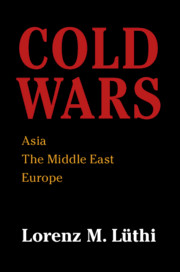Book contents
- Cold Wars
- Cold Wars
- Copyright page
- Dedication
- Contents
- Maps
- Acknowledgments
- Note on Names, Transliterations, and References
- Abbreviations
- Introduction
- 1 From High Imperialism to Cold War Division
- Part I Elusive Unities
- Introduction to Chapters 2 to 4
- 2 The United Kingdom and the Arab League
- 3 The Soviet Union and the Socialist Camp
- 4 The United States and the Free World
- Part II Asia
- Part III The Middle East
- Part IV Alternative World Visions
- Part V Europe between the Superpowers
- Part VI European Détente
- Part VII The End of the Regional Cold Wars
- Notes
- Index
3 - The Soviet Union and the Socialist Camp
from Part I - Elusive Unities
Published online by Cambridge University Press: 19 March 2020
- Cold Wars
- Cold Wars
- Copyright page
- Dedication
- Contents
- Maps
- Acknowledgments
- Note on Names, Transliterations, and References
- Abbreviations
- Introduction
- 1 From High Imperialism to Cold War Division
- Part I Elusive Unities
- Introduction to Chapters 2 to 4
- 2 The United Kingdom and the Arab League
- 3 The Soviet Union and the Socialist Camp
- 4 The United States and the Free World
- Part II Asia
- Part III The Middle East
- Part IV Alternative World Visions
- Part V Europe between the Superpowers
- Part VI European Détente
- Part VII The End of the Regional Cold Wars
- Notes
- Index
Summary
The Socialist Camp was a Soviet creation. In the wake of the Soviet military advance across the eastern half of Europe in World War II, Stalin’s USSR imposed communist regimes. As the Cold War heated up, the Soviet Union tightened controls in 1947-48, alienating Yugoslavia in process but also attracting the communist parties from China and Albania. The Socialist Camp appeared sturdy but was internally brittle. After Stalin’s death in 1953, his successors tried to regain legitimacy by reforming the USSR. De-Stalinization opened up rifts with China, Romania, and Albania, and created political crises in East Germany, Poland, and Hungary. The rise of a conservative Soviet leadership in the mid 1960s did not smother conflict within the Socialist Camp but ultimately convinced the USSR to shore up a rump-camp through military means. The intervention in Czechoslovakia in 1968 ended the erosion of Soviet influence in Eastern Europe, but undermined the capacity of the Soviet system to reform itself. It further alienated other socialist states like China, Romania, and Yugoslavia while convincing Western European communist parties to reform themselves into democratic organizations.
- Type
- Chapter
- Information
- Cold WarsAsia, the Middle East, Europe, pp. 68 - 89Publisher: Cambridge University PressPrint publication year: 2020

